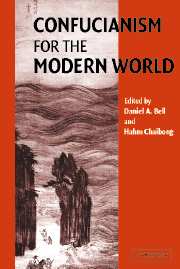Book contents
- Frontmatter
- Contents
- List of Contributing Authors
- Acknowledgments
- Editors' Note
- Introduction: The Contemporary Relevance of Confucianism
- PART I CONFUCIAN PERSPECTIVES ON DEMOCRACY
- PART II CONFUCIAN PERSPECTIVES ON CAPITALISM
- 7 Center-local Relations: Can Confucianism Boost Decentralization and Regionalism?
- 8 Affective Networks and Modernity: The Case of Korea
- 9 Confucian Constraints on Property Rights
- 10 Giving Priority to the Worst Off: A Confucian Perspective on Social Welfare
- PART III CONFUCIAN PERSPECTIVES ON LAW
- Epilogue: Why Confucius Now?
- Index
9 - Confucian Constraints on Property Rights
Published online by Cambridge University Press: 28 August 2009
- Frontmatter
- Contents
- List of Contributing Authors
- Acknowledgments
- Editors' Note
- Introduction: The Contemporary Relevance of Confucianism
- PART I CONFUCIAN PERSPECTIVES ON DEMOCRACY
- PART II CONFUCIAN PERSPECTIVES ON CAPITALISM
- 7 Center-local Relations: Can Confucianism Boost Decentralization and Regionalism?
- 8 Affective Networks and Modernity: The Case of Korea
- 9 Confucian Constraints on Property Rights
- 10 Giving Priority to the Worst Off: A Confucian Perspective on Social Welfare
- PART III CONFUCIAN PERSPECTIVES ON LAW
- Epilogue: Why Confucius Now?
- Index
Summary
INTRODUCTION
Confucius, as we know, stressed rule by moral example and opposed heavyhanded governmental control. Mencius extended this bias against state intervention to the economic realm. He suggested that anything beyond a taxation level of “one in ten” is “morally wrong” (III.B.8, Lau).1 Minimal taxation would also have desirable economic consequences: “Tend the fields of grain and flax well, tax their yield lightly, and the people will be prosperous” (7A.3, Dobson). The government, he added, should refrain from fixing the prices of goods under exchange. Since people understand that different things have different value, the prices of goods should be primarily determined by means of people's judgment of the worth of goods:
That things are unequal is part of their nature. Some are worth twice or five times, ten or a hundred times, even a thousand and ten thousand times, more than others. If you reduce them to the same level, it will only bring confusion to the Empire. If a roughly finished shoe sells at the same price as a finely finished one, who would make the latter? (3A.4, Lau)
Nor should the state levy import duties: “At the frontiers, travelers should be inspected but not taxed” (2A.5, Dobson). Mencius, in short, argues that restrictions on trade and high taxes result in the demoralization and the pauperization of the people.
- Type
- Chapter
- Information
- Confucianism for the Modern World , pp. 218 - 235Publisher: Cambridge University PressPrint publication year: 2003
- 13
- Cited by



